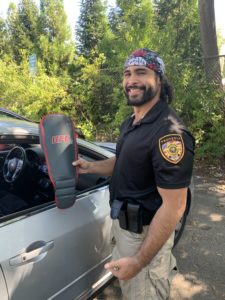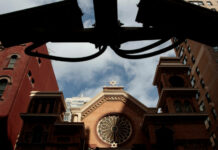On the night of Sept. 16, Aish Chaim was wrapping up Yom Kippur with an evening service in a congregant’s backyard.
Between 8 and 9 p.m., a woman walked up and tried to gain entry, according to Grant Schmidt, a congregant and a member of the synagogue’s contracted security team, the Protexia Detective and Security Agency. She was wearing a Christmas wreath on her head, yoga pants and a low-cut vest.

The woman tried to gain entry multiple times but was stopped by Lewis Padilla, the armed security officer on duty. Then, she started yelling.
She said she wasn’t being let in because she was Black; she shouted antisemitic obscenities like “Jewish devils”; and then she started hollering at Padilla to shoot her.
Finally, Padilla called the Lower Merion Police Department. At least two police cars quietly drove up and detained the woman without conflict. They didn’t arrest her, but they did call an ambulance to take her away.
Out back, the service finished uninterrupted, Rabbi Binyomin Davis said.
Aish Chaim’s security detail worked with the local police department to stop a potential attack. About 40 synagogue members were present for the service.
Schmidt was not present. But he did talk to Padilla and the Protexia team about the episode afterward. A Protexia leader confirmed his account to the Jewish Exponent. The LMPD declined to provide an incident report, citing Pennsylvania’s Right to Know Law that allows agencies to exclude non-criminal investigative materials from the media.
Before being taken away, the woman threw her Christmas wreath over the hedges and into the backyard, Schmidt said. Some attendees saw it and wondered if it fit into “suspicious package territory,” he added.
But in the end, it was just a wreath. Other than that, the incident didn’t register inside the service, Davis said.
The rabbi didn’t even find out about it until after.
Davis called the security guards, like Schmidt and Padilla, who is not a congregant, “well-trained guys who know how to handle these situations.”
Davis’ analysis makes the incident sound almost routine. That’s because, in a way, it is.
The rabbi took over leadership at Aish Chaim in 2018, the same year that the Pittsburgh Tree of Life synagogue complex shooting that killed 11. After the shooting, Aish Chaim started using security at all of its events, including Shabbat services, a policy that continues today.
Davis called security “a huge line item” in the synagogue’s annual budget. But as the Yom Kippur episode showed, it’s worth it, he said.
Antisemitic incidents rose in the United States in the second half of the 2010s. And over the last couple of years, homicides have been rising in Philadelphia.
This year, the city surpassed 400 homicides in September. Philadelphia’s record for a single year is 500.
Davis is paying close attention to this, too, as Lower Merion Township is just across from City Avenue.
“To say we’re not in Philly is just silly,” the rabbi said.
According to Schmidt, Aish Chaim congregants do not mind seeing armed security guards at religious events. Instead of scaring them, it makes them feel safe, he added.
Over the summer, Aish Chaim even held an open meeting, involving congregants, to discuss security.
“It’s important to have a plan, and not to pretend we’re living in some kind of utopia,” Davis said. “That’s naivete.”
Schmidt credited the LMPD with answering the Sept. 16 call in a responsible manner. But he said synagogues need to look out for themselves.
The congregant/security guard believes it’s a mistake to discuss police officers as “first responders.” They are actually “second responders,” he said.
The first responders are the line of defense on site, not the local officials who only come if something happens. And this line of defense is vital.
“If you don’t feel safe to come to shul, you won’t go,” Schmidt said. “If you don’t feel safe sending your kid to Jewish programming, you won’t send them.”
The Orthodox man even argued that securing your property, organization and community is a mitzvah.
“If you had a cliff on your property, or some sort of hazard, to not deal with it would be immoral,” Schmidt said. “You would have to take care of it.”
[email protected]; 215-832-0740







Good job protecting the flock sir!